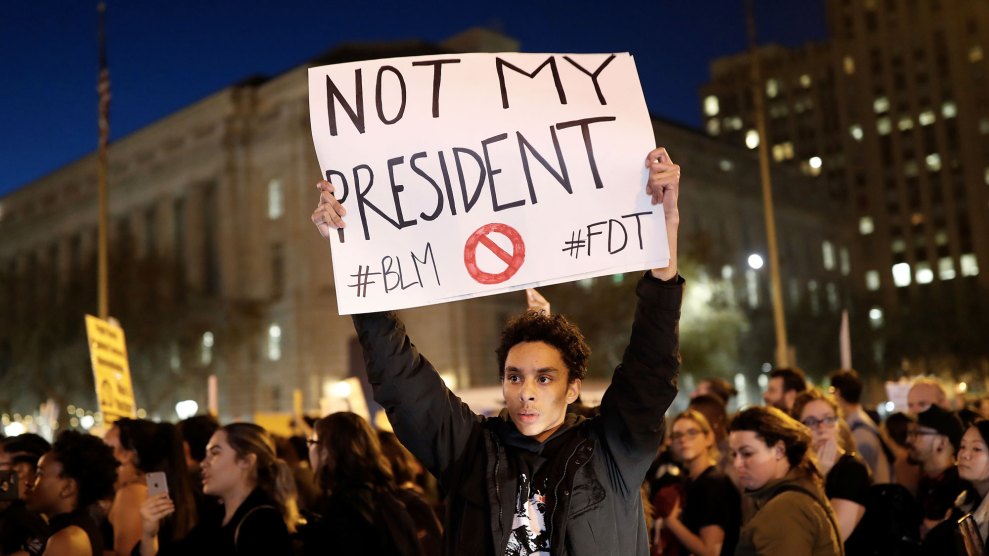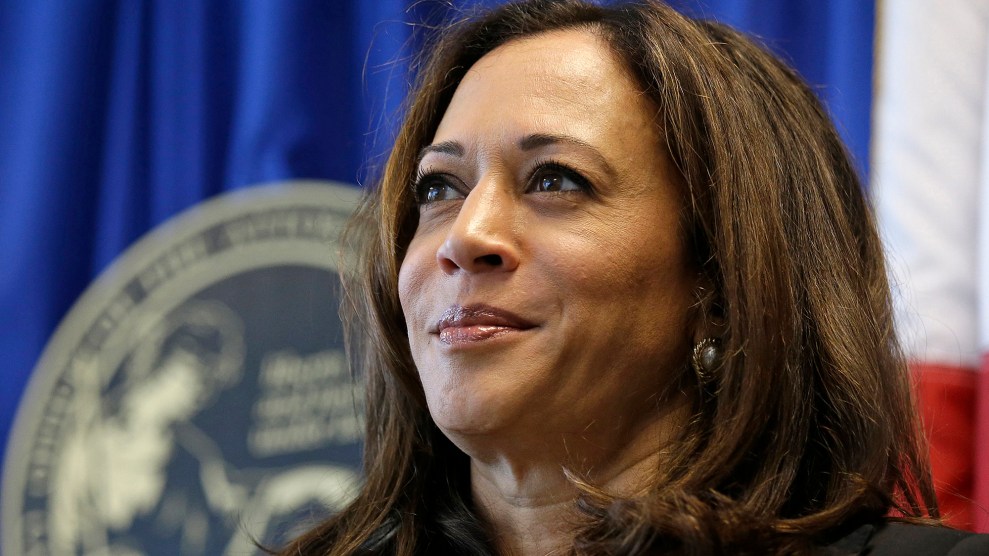
A rally on November 10 in San Francisco.<a href="http://flickr.com/link-to-source-image">Stephen Lam</a>/Reuters
Here in America’s most populous state, the wealthy pay the nation’s highest income tax rate, the minimum wage will soon rise to $15 an hour statewide, more than a quarter of the population is foreign born, and the economy is booming. California, the world’s sixth-largest economy and a bastion of progressivism, is now being hailed as a kind of great blue firewall—Democrats’ most important bulwark against the retrograde policies of Donald Trump.
“If you want to take on a forward-leaning state that is prepared to defend its rights and interests, then come at us,” Xavier Becerra, the state’s incoming attorney general, taunted the president-elect in December.
“One thing that should be made very clear is that one election won’t change the values of the state of California,” Kevin de León, the Senate president pro tempore, told Mother Jones. “What we would say to the incoming Trump administration is that we hope you find value in what we do in California—by growing the economy, creating real jobs that can be verified, reducing our carbon footprint, respecting immigrants for who they are, and recognizing that diversity, a rich mosaic of different hues, is actually a strength, not a weakness.”
Soon after Trump announced Cabinet nominees that “confirmed our worst fears about what a Trump presidency would look like,” says de León, he and his colleagues in the Statehouse retained former US Attorney General Eric Holder to advise on potential legal challenges from the next White House. “He brings a lot of legal firepower to do everything within our power to protect the policies, people, and progressive values of California.”
In a state where Democrats control all statewide elected offices and a supermajority of the Legislature, the economy grew 4.1 percent in 2015—the fastest in the country and nearly double the national average. Since 2011, when Democrat Jerry Brown replaced Republican Arnold Schwarzenegger as governor, the state has turned a $26 billion budget deficit into a surplus that is projected to include upward of $8 billion for a rainy-day fund by the end of 2017. California has leveraged its booming economy to expand social services; since 2014, it has increased its budget for child care and preschool for low-income children by 24 percent, to $3.7 billion.
Trump’s bigoted rhetoric and alignment with far-right extremists during the presidential campaign alienated many people in California, which boasts an economy that in many ways is defined by immigrant labor, global free trade, and a progressive regulatory regime. A push to deport undocumented farmworkers could hurt the state’s agricultural sector. The green-energy sector fears a loss of subsidies and more drilling, maybe even in pristine federally protected waters just off the coast. Silicon Valley is suspicious of Trump on cybersecurity, trade protectionism, and the import of highly skilled tech workers. And then there is Hollywood: Meryl Streep’s condemnation of Trump at the Golden Globes this month underscored a deep antipathy for the president-elect among celebrities, many of whom have declined to perform at his inauguration.
But California’s leaders aren’t just engaging in a rhetorical war on Trump. Here’s what the Golden State is already doing to counter the president-elect on a range of major issues and defend its progressive achievements.
Climate Change
Trump famously suggested global warming is a Chinese hoax and has vowed to “cancel” the Paris Accord committing nearly every nation to curb emissions. His pick to lead the Environmental Protection Agency, Oklahoma Attorney General Scott Pruitt, is a climate change denier best known for suing the EPA in an effort to overturn its clean-energy policies. A darling of oil and coal interests, Pruitt has vowed as EPA chief to fight “unnecessary regulations” and promote “freedom for American business.”
But even if the Trump administration works to pull America back toward its carbon-spewing past, it will have little impact in California, which last year enacted a bill requiring the state to slash greenhouse gas emissions to 40 percent below 1990 levels by 2030. Recently, Gov. Brown and other state leaders said they would bypass Trump and work directly with other nations and states to reduce emissions; California already trades emissions credits with Quebec, and in 2013 the state inked a pact with China committing to joint efforts to combat climate change and support clean energy—the only such agreement China has signed with a subnational government.
California plays a unique role in setting national energy policy: Section 209 of the Clean Air Act allows California, but not other states, to set its own stricter-than-federal emissions standards for automobiles if they address “compelling and extraordinary conditions.” Other states are then allowed to adopt those regulations. To date, 10 other states, representing 40 percent of the US population, have signed on to California’s tighter efficiency and emissions rules for cars, appliances, and automobiles. “The California standard actually governs in many cases rather than the federal standard,” notes Hal Harvey, president of Energy Innovation, a policy research group in San Francisco, “because nobody wants to make two product lines.”
California plays a less decisive role in directly supporting environmental sciences and energy research, which depend heavily on federal support, but Brown has signaled a desire to step in if Trump pulls the plug. “We’ve got the scientists, we’ve got the lawyers, and we’re ready to fight,” Brown said at the American Geophysical Union Conference in San Francisco. He even suggested that if Trump follows through on some advisers’ ambitions to end NASA’s role in climate science, California could step in and “launch its own damn satellite.”
Immigration
Though Trump campaigned on the idea of deporting America’s estimated 11 million undocumented immigrants, he has more recently said he will focus first on deporting 2 million to 3 million immigrants with criminal records—a number that would presumably include many people who’ve committed minor infractions. (Only about 820,000 undocumented immigrants have been convicted of crimes, according to the nonpartisan Migration Policy Institute.) But pursuing mass deportations in California won’t be easy. A 2014 law bans state authorities from holding immigrants convicted of minor crimes for any longer than required by criminal law, thereby protecting them from being turned over to federal authorities for deportation. Many California cities have even broader “sanctuary city” policies.
Last month, state legislators introduced a package of bills that would go even further: Legislation authored by de León would bar state and local authorities from enforcing immigration laws, limit records sharing with federal immigration officials, and create “safe zones” at schools, hospitals, and courthouses where immigration enforcement would be prohibited. “To the millions of undocumented residents pursuing and contributing to the California Dream, the state of California will be your wall of justice should the incoming administration adopt an inhumane and overreaching mass-deportation policy,” de León said last month.
Other proposed bills would subsidize immigrant legal services by training public defenders in immigration law and setting up a fund to cover legal bills for immigrants caught up in deportation proceedings. Studies have shown that immigrants with a lawyer are far more likely to succeed in challenging deportation proceedings. Los Angeles last month announced a $10 million immigrant legal fund; the San Francisco Public Defender’s Office has proposed a similar $5 million fund.
More than a quarter of immigrants in the United States illegally live in California. In 1994, voters approved Proposition 187, a ballot measure making undocumented immigrants ineligible for public benefits. But since then, the state has moved sharply in the other direction. In 2011, Brown signed the California DREAM Act, allowing Californians who came to the country illegally when they were children to apply for financial aid from state colleges. In 2013, California allowed undocumented immigrants to obtain driver’s licenses, qualify for in-state tuition, and obtain law and other professional licenses. Last year, the state expanded its California-only Medicaid (Medi-Cal) program to undocumented children.
Anticipating that the Trump administration could use records collected through such programs to identify and round up undocumented immigrants, the American Civil Liberties Union is pushing for further safeguards here. “We’re concerned about ensuring that information is protected and can remain confidential,” says Jennie Pasquarella, the director of immigrant rights for the ACLU of California. “It is critical that California first show a model for the rest of the country—our values as a state that is filled with immigrants.” California’s Kamala Harris announced earlier this month that her first act as a US senator would be to co-sponsor legislation to protect the nation’s 744,000 “DREAMers” from deportation.
Health Care
Republicans and Trump have vowed to repeal the Affordable Care Act—but in California the law is overwhelmingly popular and successful. The law has provided $20 billion for the Medi-Cal program and for insurance subsidies for 1.2 million Californians, helping to cut the state’s uninsured rate by half, from 6.5 million people in 2012 to 3.3 million in 2015. Patient advocacy groups don’t want to give up those gains. In December, the California Endowment announced that it would spend $25 million over three years to defend against federal cuts to Obamacare and other social programs. “California has made great progress both economically and on the health front over the past several years,” says Daniel Zingale, senior vice president of the Endowment’s Healthy California program. “We think it is important to defend that from threats in Washington.”
Several California leaders are even pushing Trump to replace Obamacare with “Medicare for All,” a.k.a. single-payer health care. “The one I am counting on the most [to push nationalized health care] is Trump,” RoseAnn DeMoro, the head of the Oakland-based National Nurses United union, told Politico, citing Trump’s “international perspective” as a businessman and the fact that his wife comes from Slovenia, which has a single-payer system. Another major backer of “Medicare for All” is California Lt. Governor Gavin Newsom, who as mayor of San Francisco in 2007 launched Healthy San Francisco, a health care plan available to all city residents regardless of their immigration status, employment, or preexisting conditions.
Marijuana
Trump’s pick for attorney general, Alabama Sen. Jeff Sessions, last year killed a bipartisan bill that would have reduced prison sentences for some lower-level drug offenders. He said last April that “good people don’t smoke marijuana” and that “we need grown-ups in charge in Washington to say marijuana is not the kind of thing that ought to be legalized.”
Though Sessions moderated that rhetoric during his confirmation hearing this week, his nomination is staunchly opposed by California’s $3 billion legal marijuana industry and its representatives in Washington. “Sessions has a long history of opposing marijuana reform, and nothing he said at the hearing suggests he has changed his mind,” Bill Piper, senior director of the Drug Policy Alliance’s Office of National Affairs, said in a press release. The DPA was a major backer of November’s successful California Proposition 64, which legalizes recreational marijuana.
In an echo of the Proposition 64 campaign, drug policy reform groups have partnered with civil rights groups such as the NAACP and LatinoJustice to oppose Sessions on the grounds that the war on drugs has fueled mass incarcerations of people of color for nonviolent offenses. They want to make sure Trump stands by his 2015 statement to the Washington Post that marijuana legalization “should be a state issue.”
Marijuana industry leaders expect California to vigorously defend Proposition 64 from any federal court challenges. “We would expect a very, very strong pushback from the state, because the reality is it’s a public safety issue,” Nate Bradley, executive director of the California Cannabis Industry Association, told the Los Angeles Times. “They have decriminalized a product, so if you don’t allow any sort of regulation in place for people to access that product, the underground market is only going to grow.”
Guns
Enthusiastically endorsed by the National Rifle Association, Trump has vowed to diminish federal gun regulations, including eliminating gun-free zones at schools and on military bases, and he supports a national right-to-carry law for concealed guns. During the presidential campaign he also suggested he would appoint an explicitly anti-gun-control justice to the US Supreme Court.
But California this year further strengthened its gun laws, which were already among the toughest in the nation. In July, Brown signed off on legislation that outlawed the possession of ammunition magazines that hold more than 10 bullets, required background checks for the purchase of ammunition, and banned the sale of certain types of semi-automatic assault rifles. Proposition 63, approved by voters in November, added requirements for owners to report lost and stolen guns and created a system for confiscating guns from felons.
“The United States is a federal republic, not a monarchy, and California plays an outsized role in our nation’s success,” Lt. Governor Newsom, the architect of Proposition 63, said in a statement to Mother Jones. “The reduction of our state’s gun violence rate is a model for the nation and we’re resilient, flexible, and well prepared for any effort by the NRA and the President-elect to make California a Wild West again.”
One place where California hasn’t pushed back much against Trump since the election is Silicon Valley. A few rank-and-file tech workers have held meetings with civil rights groups, but tech CEOs have quietly sidled up to the president-elect. A few weeks ago, a handful of top tech names climbed Trump Tower for an awkward photo op with Trump and his children. “We definitely gave up a little stature now for possible benefit later,” one source told Recode’s Kara Swisher at the time. “It’s better to be quiet now and speak up later if we have to, and save our powder.”
The San Francisco-based Electronic Frontier Foundation, which defends free speech and privacy on the internet, took out a full-page advertisement in Wired magazine in December, warning the technology community, “Your threat model has changed.” The ad calls upon tech companies to secure their networks against an incoming Trump administration by encrypting user data, scrubbing data logs, and disclosing government data requests while fighting them in court.
“For California, Trump is creating a lot of fronts where organizations and government are going to be fighting battles,” says Dave Maass, an investigative researcher at EFF. “We are focused on civil liberties and privacy, and we believe they are fundamental to whatever kind of activism battle that you want to fight. If you don’t have free speech and don’t have the ability to organize, then you can’t do anything.” He anticipates that California lawmakers will be generating a flurry of new bills, and that no small number of them “are going to be direct responses to Trump.”

















